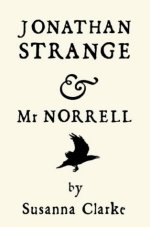|
Susanna Clarke Susanna Clarke was born in Nottingham in 1959. A nomadic childhood was spent in towns in Northern England and Scotland. She was educated at St Hilda's College, Oxford, and has worked in various areas of non-fiction publishing, including Gordon Fraser and Quarto. In 1990, she left London and went to Turin to teach English to stressed-out executives of the Fiat motor company. The following year she taught English in Bilbao. She returned to England in 1992 and spent the rest of that year in County Durham, in a house that looked out over the North Sea. There she began working on her first novel, Jonathan Strange & Mr Norrell. From 1993 to 2003, Susanna Clarke was an editor at Simon and Schuster's Cambridge office, where she worked on their cookery list. She has published seven short stories and novellas in US anthologies. One, "The Duke of Wellington Misplaces His Horse," first appeared in a limited-edition, illustrated chapbook from Green Man Press. Another, "Mr Simonelli or The Fairy Widower," was shortlisted for a World Fantasy Award in 2001. She lives in Cambridge with her partner, the novelist and reviewer Colin Greenland. .- Bibliografija |
|
Džonatan Strejndž & gospodin Norel Susanna Clarke
I adored this book. So much so that, even now, weeks after finishing it, I still have not been able to bring myself to read another fantasy novel. I am sticking to non-fiction for the time being. At the same time, I recognize that not everyone will love this book as much as I did. First of all, it's a very fat book; and it starts slowly, with Ms. Clarke confidently drawing the reader little by little into her version of 19th century England, where the story takes place. The plot continues to meander and unfold, with occasional bursts of intensity, but with no battles of epic proportions (ummm... unless you count the Battle of Waterloo), no slaying of dragons (unless you count the French), and no long-lost objects filled with magical power (unless you count a library full of obscure books). In short, this is no Tolkien-esque fantasy. The story, like the characters in it, is politic, witty, sparkling, aloof, well-mannered, and intelligent. For this is a story about gentlemen, after all. Two gentlemen in specific, who also just happen to be the last English magicians of the 'Modern Age.' Jonathan Strange & Mr Norrell is divided into three parts. It begins (even though the title promises otherwise) with Mr Norrell. This will make some of you unhappy, because Mr Norrell is a stodgy, nervous and particular older gentleman, prone to think far too highly of himself and paranoid of the motives of all those around him. In short, he is not that easy to like and not at all, as Ms. Clarke points out, what a modern magician 'ought to be.' Yet, the first third of the book is about him. I thought this was actually a pretty clever choice, however, because by the time you get to the second part about Jonathan Strange you are so glad to meet him at last (after only reading about him in references made in the footnotes during part one -- oh yes, there are footnotes, and they are at times more amusing than the story itself) that you instantly love him. He is quite the opposite of Mr Norrell -- charming, daring, passionate, young and handsome -- and after he appears, the main part of the story focuses on the relationship between the two and the inevitable clashings of their ideologies. The third part is called "John Uskglass." 'Wait a minute', I hear you saying, 'his name is not in the title -- just who is this interloper, Uskglass?' Well, you'll have to read the book to find out. Mr Norrell emerges out of decades of seclusion in his isolated library to prove that English magic has not completely been lost and that he is the sole remaining practical (rather than theoretical) magician. He sets about, in his own pedantic way, to restore English magic and make himself useful to the government in the wars against the French, and so on. It soon becomes evident, however, that he is not the only magician in England. There is another: Jonathan Strange. Norrell takes on Strange as his pupil but refuses, in his paranoid way, to teach him even half of what he knows. Nevertheless, Strange is obviously more naturally talented than Norrell, and the inevitable falling out occurs. They cause stones to speak, the dead to rise, faeries to appear, ships to be formed out of clouds, the topography of Spain to change, and the coastline of England to stop eroding. 'But what is the point?', a habitual reader of Oprah Book Club selections was heard to ask upon finishing this book. Well, that's just it -- there really isn't one. Unless you will accept a great read as the point. Clarke is a new author, but you would never know it. She writes with an ease and confidence that some authors never achieve with experience. Her quiet, wry sense of humour and steely wit is reminiscent of Jane Austen and William Makepeace Thackery. Indeed, you could almost think of this book as an homage to those great 19th century novelists, which at the same time enfolds the traditions of English fairy stories and Arthurian legends, lacing in an astute knowledge of history. So, I'm afraid I've now become one of those people who go on and on about how great a certain book is. I've been trying to convince my customers to buy it, trying to convince them not to be turned off by how fat Jonathan Strange & Mr Norrell is. 'I've heard a lot about this book,' they say, 'can it really be as good as all that?' Yes, I tell them, it can. A review by Margo MacDonald
|
